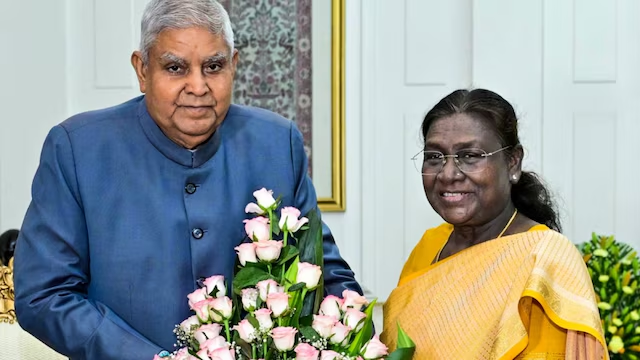
In a surprising move that has left the nation buzzing, Vice President Jagdeep Dhankhar resigned on July 21, 2025, citing health concerns. His departure has created a major power vacuum in India’s constitutional setup, with Deputy Chairperson Harivansh Narayan Singh now temporarily leading the Rajya Sabha.
But as speculation builds, many are wondering—was this resignation just about health, or is something more strategic unfolding?
The Nation’s Breath Held: Why Did Dhankhar Really Walk Away?
No grand press conference. No televised farewell. Just a simple resignation letter delivered to President Droupadi Murmu—and with that, the vice president’s chair stood empty.
Dhankhar’s exit has sparked a wave of curiosity. After all, he had been actively participating in debates, speaking at public forums, and showing no visible signs of illness. Known for his strong grip over Rajya Sabha proceedings and his bold constitutional remarks, his sudden disappearance from the political spotlight has raised more questions than answers.
Was this really a health decision—or was it timed to perfection just months before the next general elections?
Not Just a Health Crisis? Rumors, Reports, and Real Tension
While the stated reason is “serious health complications,” murmurs from behind the scenes suggest otherwise.
Dhankhar was never shy about voicing his concerns. Whether it was calling out disorderly conduct in the Rajya Sabha or questioning judicial overreach, he often walked the fine line between formality and confrontation.
According to multiple political insiders, this assertiveness may have begun clashing with the quiet discipline the ruling party prefers before a crucial election cycle.
Some reports suggest that Dhankhar even submitted a confidential note to the President, flagging concerns about unethical parliamentary practices.
Combine that with the fact that he was allegedly excluded from key government briefings, and it paints a picture that feels far less like retirement—and far more like a strategic exit.
Harivansh to the Rescue: Calm Face, Big Responsibility
With Dhankhar’s departure, the Rajya Sabha couldn’t afford a leadership vacuum—especially with pending bills on data regulation, farmers’ welfare, and AI oversight.
Enter Harivansh Narayan Singh, the soft-spoken but steady Deputy Chairperson from JD(U), who has now stepped in as acting Rajya Sabha Chairman.
While Harivansh doesn’t become vice president, his temporary control over the Upper House is politically significant. He’s respected for his fair approach and background in journalism, but all eyes will be on whether he can maintain impartiality as key legislation faces stiff opposition.
Countdown Begins: Election for New Vice President Must Happen by September 19
As per Article 66 of the Constitution, a new vice president must be elected within six months of the position falling vacant. That means India must go to the polls for its next VP by September 19, 2025.
The Election Commission is expected to declare the schedule by early August. Only Members of Parliament (MPs)—543 in the Lok Sabha and 245 in the Rajya Sabha—will vote through a secret ballot system.
While it may seem like a low-profile constitutional formality, this election could shape the narrative heading into 2026. Why? Because the vice president isn’t just a ceremonial post—they’re often seen as the stepping stone to the presidency.
Was It a Goodbye or a Gentle Push? Political Chess Behind the Curtains
Let’s be honest—timing is everything in politics.
Dhankhar’s resignation comes at a time when every party is recalibrating its strategy ahead of the high-stakes 2026 General Elections. Some analysts believe his vocal style and independent streak made him too unpredictable for a leadership that values unity above all.
Others argue he chose to bow out gracefully, sensing that a storm was brewing. Either way, his exit clears the path for someone more “aligned” with the political roadmap of the ruling alliance.
Strategic exit or quiet removal? You decide.
The Race for the Rajya Sabha Gavel: Who’s Eyeing the VP Chair?
With the vice president’s seat now vacant, both the ruling NDA and the opposition INDIA bloc are in the middle of fierce internal brainstorming.
In the BJP/NDA camp, strong contenders include
- Dr. Sudha Yadav—Symbol of social equity and gender representation
- Om Birla—Former Lok Sabha Speaker known for discipline and neutrality
- Bhupender Yadav—Trusted BJP minister and skilled negotiator
From the INDIA bloc, a few big names are doing the rounds:
- Sharad Pawar—veteran with decades of experience and strategic acumen
- Kapil Sibal—Legal heavyweight with parliamentary finesse
- Shashi Tharoor—Charismatic and globally known, though still a long shot
This election could become a barometer for the opposition’s unity—or lack of it.
Beyond the Headlines: Why This Matters More Than You Think
Jagdeep Dhankhar’s resignation is more than just a political blip. It’s a moment that reveals how India’s democratic institutions respond to abrupt changes—and how power frequently changes hands quietly rather than loudly.
At first glance, it looks like just another news flash: a high-ranking official resigns, someone else steps in, and a new election is scheduled. But dig deeper, and you’ll see it touches multiple layers of national power:
- It exposes the fragility of leadership in high offices. Even the most prominent roles can be vacated in an instant—without public warning, explanation, or accountability.
- It tests the resilience of our parliamentary system. Can the Rajya Sabha function smoothly under interim leadership? Can Parliament handle transition without chaos?
- It activates the machinery of succession. From Election Commission planning to party negotiations and opposition strategies, everything moves into motion the moment one man steps down.
- It quietly shapes the narrative going into 2026 and beyond. Who steps in as vice president now may set the tone for who becomes president next—and what kind of leadership India leans toward post-2027.
This isn’t about one politician. It’s about watching democracy adapt, shift, and recalibrate in real time—often in ways that aren’t taught in textbooks or televised in full.
Because in Indian politics, what’s not said often speaks loudest. And this moment? It’s echoing far beyond the Rajya Sabha walls.
The Resignation That Set the Political Dominoes in Motion
Jagdeep Dhankhar’s quiet exit has done more than empty a chair—it’s triggered a chain reaction across India’s political landscape.
A new vice president will be chosen by September. A new narrative is forming ahead of 2026. And with the 2027 presidential election on the horizon, many believe the BJP may already be preparing a loyal successor for Rashtrapati Bhavan.
FOR MORE BLOGS – beyondthepunchlines.com

 Add to favorites
Add to favorites





